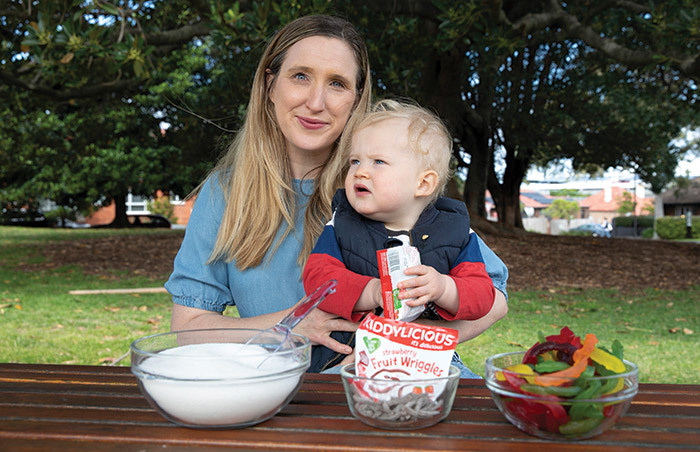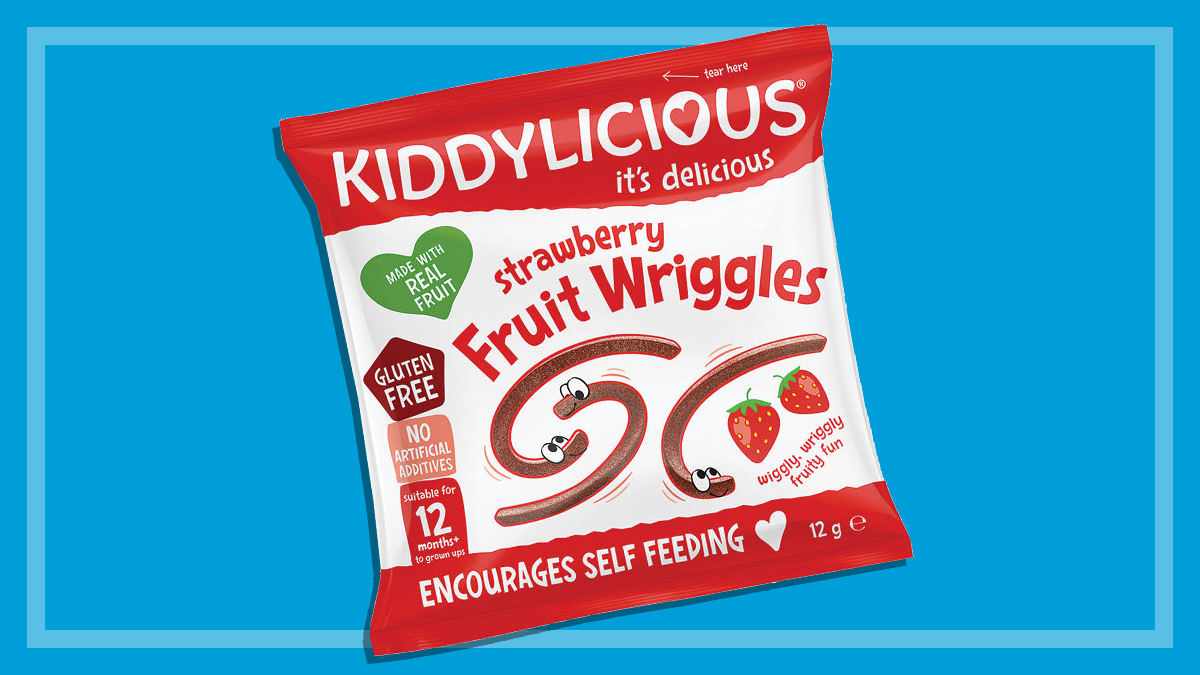Newsflash! Kids really like sugar. But as we know, it’s really not that good for them, especially not their teeth.
And parents tend to shop accordingly, pushing like soldiers through the confectionery aisles, pulling their kids away from the endless stacks of sugary treats at the checkout and instead seeking out healthier snack options – often in the baby and toddler food section.
Judging by the package, Kiddylicious Strawberry Fruit Wriggles don’t look that bad for you and many parents would think them a good option for their children.
After all, they have no artificial additives and are gluten-free. They’re even suitable for kids (make that babies) as young as 12 months, according to the label.
But the healthy sheen quickly fades once you take a closer look at the ingredients.
We’ve called out a lot of sugary kids’ stuff over the years, but these fruit wriggles truly take the biscuit.
The Wriggles packaging really is pretty sneaky. They’re described on the pack as “thin strips of real fruit” that are “made with real fruit”, but they’re really just jelly strips made from concentrated fruit sugars – and a whole lot of them.
More than two thirds (68.8%) of each one of these wriggly little jellies is sugar!
By comparison, a more familiar sweet jelly treat, Allen’s Snakes Alive, boasts a sugar content that’s less than that of Wriggles per 100g (43.8g versus 68.8g, respectively). That said, the Snakes still deliver a motherlode of sugar and neither would be considered a good option for young kids.
“Everyone knows that fruit is good for you, so putting descriptions on the pack that liken the product to real fruit has the potential to mislead parents,” says CHOICE food and nutrition expert Rachel Clemons.
“Not only is the ‘fruit’ content just concentrated fruit sugars, it’s also devoid of fibre and other nutrients found in whole fruit.”
Then there’s the issue of the misleading product name.
“The product refers to strawberries, but actually most of the fruit sugars are coming from apples,” says Clemons. “Why not feed your kids slices of fresh apple or other fruit instead? Not only will they get the benefit of fibre and other nutrients in whole fresh fruit, it’s also a much cheaper option.”
Way, way cheaper. Kiddylicious Strawberry Fruit Wriggles cost $15 per 100g, whereas you can pick up fresh apples for about $0.39 per 100g.
71% of parents overall thought Wriggles were a healthy choice
While researching this shonky snack, we carried out a national survey to determine the perceived healthiness of Wriggles versus Snakes lollies, based on the packaging. More respondents (60%) thought Wriggles were healthier than Snakes (32%), and 71% of parents overall thought Wriggles were a healthy choice.

So it’s not hard to see why snack manufacturers invest so much time and energy in how they package their products.
CHOICE mum and audience editor Pru Engel regularly deals with food products marketed to kids that aren’t what they appear to be.
“I’d never give my toddler a jelly snake, but I have definitely picked up a bag of snacks for him in the baby and toddler aisle when I was in a rush or looking for something new for him to try,” she says.
“Parents should be able to trust that these products marketed specifically for young children aren’t filled with nasties and certainly that they don’t contain more sugar than a lolly.”
Parents should be able to trust that these products marketed specifically for young children aren’t filled with nasties
Pru Engel, CHOICE audience editor
These wriggles may have set a new standard in sugary shonkiness, but they’re really just business as usual for the food industry.
In our recent review of 78 packaged meals and snacks for toddlers we found that:
- more than half (58%) contain added sugars that are harmful to kids’ health
- almost half (45%) could be classified as high in sugar, meaning they contain at least 15g of sugar per 100g
- in the total samples we reviewed, sweet products outnumbered savoury products by almost two to one.
“As a parent you’re always trying to do the right thing by your kids, but you’re also incredibly time-poor and when they’re small, you’re probably sleep deprived too,” Engel says.
“It’s shocking that there are products out there that are deliberately misleading and making our job harder than it needs to be.”
How does the food industry get away with this?
For a start, there are no rules for food packages to help people identify added sugar. At CHOICE, we’ve long argued that products with added sugar need to be clearly labelled and easy to identify. This lack of regulation – combined with kids’ love of sugar – has certainly been a windfall for food makers.
But as CHOICE’s Rachel Clemons wisely points out, “Children don’t need special snacks made specially for them, they can eat the same healthy foods as the rest of the family.”

